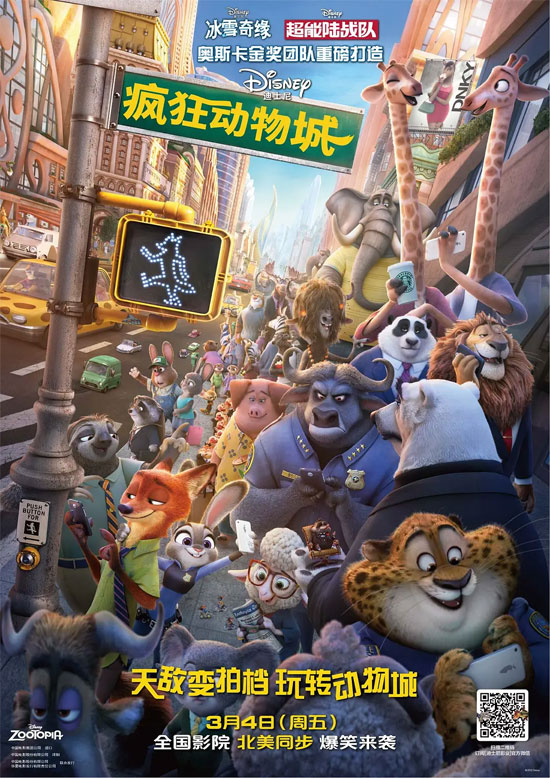Film Name: 疯狂动物城 / Zootopia

This is the best March animated release I’ve seen. Since most of Disney’s major animated films come out in June and November, its placement in March suggests this might not be their top-tier new release.
Moreover, it’s not even a typical Disney animation. It ditches the romantic entanglements of princes and princesses, and even moves away from the family-friendly formula. It feels more like a debut feature crafted by a small studio pouring their entire expertise into it. Such a debut boasts a plot as solid as rock, characters that are fresh and distinctive, unexpected gimmicks that surprise, and most importantly, the courage to explore themes beyond universal values.
Some animations resemble descriptive essays, others narrative prose. This animation is an argumentative essay woven with narrative. Its purpose isn’t to recount how the female rabbit officer Judy accomplished what burly male cops couldn’t, but to portray a world that appears fair and free on the surface, yet is rife with survival of the fittest and prejudice. Its purpose isn’t to recount how Nick the fox rediscovered human warmth and integrated into society, but to expose the true faces and dangers of the real liars lurking at the pinnacle of politics—liars whose deceit far surpasses Nick’s superficial lies.
The film infuses animation with satire and humor as sharp as single-panel cartoons. When you watch the iconic ice-dancing sequence of the older sister in “Frozen,” you recognize it as the pinnacle of animated spectacle. Yet when you observe the characters and settings in “Zootopia,” you invariably sense a mirror of reality beyond the dance. When the leopard grows plump, and gasps after a few steps, when a sloth works as a clerk, making government efficiency abysmal yet leaving you powerless to criticize, when the lion mayor still speaks eloquently from prison, making politics and life equally filled with theatrical performances—you always find a unique mental pleasure in the humor born from biting social commentary.
Judy’s journey from a simple rural life to the big city she longed for feels strangely familiar. Isn’t it just like Kiki’s experience in “Kiki’s Delivery Service”? Cities that appear grand and imposing often reveal a coldness in human interaction that doesn’t match their outward splendor; The city’s clamor, restlessness, narrowness, and accidents stand in stark contrast to the countryside’s tranquility, ease, comfort, and warmth. The initial excitement of arriving is swiftly swept away by an overwhelming sense of alienation; attempts at warmth meet with unprecedented rejection; efforts to build a life hit roadblocks at every turn, ideals fading like shooting stars.
Until she met him—her destined companion. What exactly about Judy moved Nick, transforming a wounded, lonely man into her devoted, warm-hearted partner? This moment transcends the film’s satire, offering its most heartening encouragement. Perhaps it began with that time Judy “got tricked” into helping him out. She didn’t have much money, yet she willingly paid $15 for a stranger’s unrelated matter. From that moment, her innocence began to influence this man, and even the entire Zootopia. One could say that $15 represents the film’s most sincere tribute. Compared to that $15, all the grandeur, wealth, and breathtaking beauty of Zootopia pale into insignificance.
Although both Qiqi and Judy are ultimately embraced by the new cities they reach, their endings are fundamentally different. Kiki’s letters home brought the story full circle to its origin, allowing the distinct cultures, rhythms, and lifestyles of rural and urban life to blend seamlessly through her presence. Yet Zootopia concludes with an idol’s dance in the city, as Judy leaves Bunnyburrow behind. What became of her farming parents and fellow rabbits who cared for her? After thoroughly satirizing the city, the film ultimately compromises with it, unconsciously forgetting what should have been returned. From this perspective, the film fails to fully articulate its ultimate stance on the countryside versus the city—that is, the simplicity and sincerity represented by the rural versus the richness and complexity embodied by the urban. Perhaps this is precisely where the difference between a master and a non-master lies.
Please specify:Anime Phone Cases » Zootopia 2016 Animation Film Review: The value of $15 surpasses all that is splendid and magnificent.